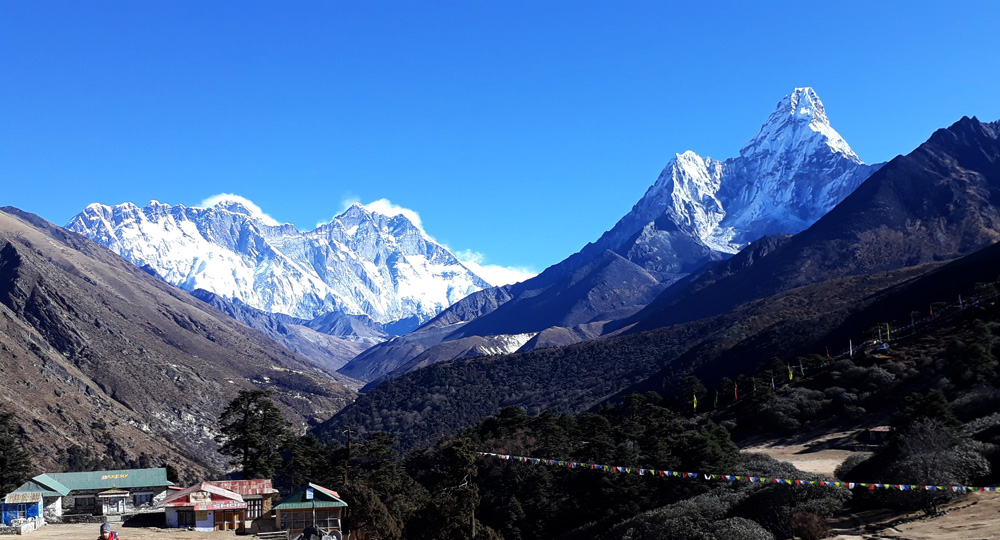
Do’s and Don’ts
1. Dress appropriately (covering shoulders and knees), especially women should avoid scanty outfits in rural areas. Showing public affection and being naked in public place is offensive.
2. Change some of your currency in Rupees (Nepalese) in customs/city for some essentials.
3. Leather items and shoes/slippers prohibited in religious places. Non-Hindu are not allowed in some Hindu temples and photograph is not allowed in some temples especially inside. So please take permission before for entry or photography. Remove shoes/slippers outside the holy place and Nepali home. Walking around temples/stupas is done clockwise.
4. Take permission before photograph of people. Photography of security places is prohibited. Taking photograph of people (especially women) bathing in river/open place is extremely rude.
5. Don't drink/smoke in religious or open public places. Don’t litter, help us in maintaining our nature clean.
6. Cow is holy & national animal of Nepal, don’t eat beef. Similarly, never consume meat of wild/endangered animals (that might be of poaching) and that may lead to punishment.
7. Don’t drink unsafe water from the tap or from the river directly, must purify it before to drink.
8. Avoid littering public places and ensure that waste is disposed only in dustbins or designated places.
9. Don’t buy animal products as souvenirs as it encourages further preying of these species. Product made from animal parts may require valid tax bill of purchase.
10. Buy local products made of Nepali raw materials (cotton, fur, silk, shrubs, metal…) and produced in Nepal that helps our economy.
10. Do not present any offensive comment/behaviour about any religion or sect, political party, it might be controversial and violent. Do not join any political rally or activists movement, otherwise you may be exiled.
11. Respect local tradition and belief.
12. Follow rules and regulations of Nepal as well as international.
13. Avoid consumption or trade of illegal drugs (drugs, marijuana, cannabis).
14. Avoid collecting any form of fauna or flora from anywhere.
15. Avoid poaching, human trafficking, vulgarity, breach of law and any criminal activity.
16. Prioritize consuming healthy fresh local meals (organic food items produced in Nepal like - brown rice, wheat / corn / millet / buck wheat bread and pudding, pop corn, potatoes, veg, fresh fruit, mutton / chicken / fresh water trout, egg…) to avoid stale date expired imported items. It is good for guests and also helps to uplift our local economy through tourism.
17. Try common meals for everyone or order less food items as possible to save time and minimize fuelwood consumption.
18. Travel through authorised tour operator and professional guide only. Tibet bordering areas of Nepal are restricted where special permission is needed. Permission is also needed to enter national parks, protected areas, security zones, some archaeological sites, some private property and TIMS permit for all trekking areas of Nepal etc. Travel only to the permitted areas. So, please ensure that enough permission is obtained. Tour operator organizes all the essential logistics.
19. If travelling in Nepal for special mission like research-based field trips, projects works or tailored course, please ensure that enough permission is obtained.
20. Do not stray from group.
21. Always remain inside accommodation at night.
22. Use rechargeable batteries. Otherwise take them back to your home country.
23. Don’t donate to beggars directly, it encourages begging but it is good to support needy people or society officially through trusted organization / local administration.
24. Travel only to the permitted areas.
25. Tipping/gratuity to Nepali crew (tipping is common in tourism field) / General Tipping for over a week trip in US$ or equivalent convertible currency or Rupees)-
Guide/cook: $5 -15 per day
Porter/helper/donkey driver/private driver: $5-10
It may be more per day for short trip (1 to 7 day trip)
Do's and Don'ts in Forests / national parks and protected areas /
-Early mornings and late afternoons are the ideal time to visit forests but national parks and protected areas in Nepal usually do not allow between 5pm and 7am.
-Travel with professional jungle guide for the safety reason.
-Carry enough drinking water and snacks.
-Don’t wear colourful clothes, be silent and disciplined to spot wild animals. Don’t chase animals. Don’t disturb any animal by making noises, flashing lights or making any sudden movements that may frighten animals.
-Avoid smoking, do not litter the surroundings and respect animals and their habits.
-Open / camp fires is discouraged to prevent deforestation.
-Be aware of wild animals, they may be dangerous and maintain a safe distance from them.
-Be careful during canoeing or boat rides. Follow professional river guide's instruction to stay balanced and safe from crocodile.